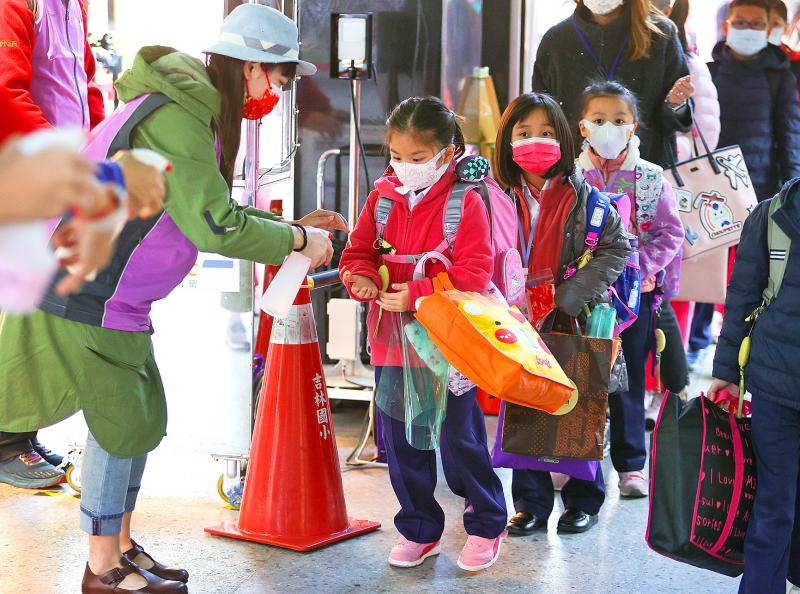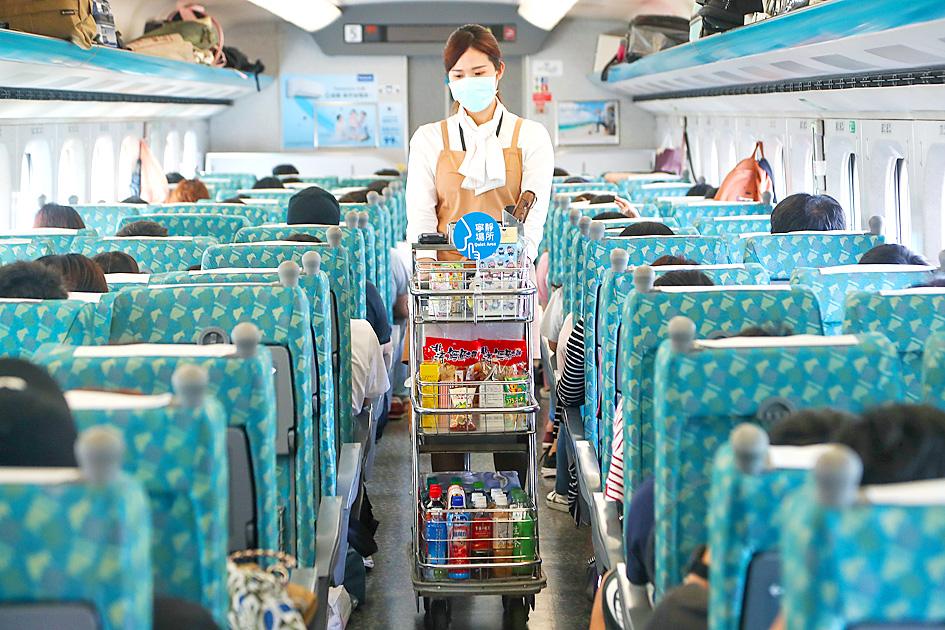The government’s autumn-winter COVID-19 prevention program is to continue beyond Sunday, but eating and drinking on high-speed trains would be allowed from Monday, the Central Epidemic Command Center (CECC) announced yesterday.
Minister of Health and Welfare Chen Shih-chung (陳時中), who heads the center, said that while there were no new confirmed cases in Taiwan yesterday, the global COVID-19 situation remains serious, so the autumn-winter COVID-19 prevention program would be extended beyond its Sunday deadline.
“Border control measures, including requiring a negative polymerase chain reaction test result obtained within three days of boarding a plane to Taiwan, and undergoing quarantine in a designated hotel, centralized quarantine facility or one person per housing unit if at home, will continue to be implemented,” he said.

Photo: CNA
Wearing a mask in eight types of public venues would also be required, and healthcare professionals would continue to adopt the expanded standards for reporting suspected COVID-19 patients for testing, Chen said.
High-speed rail passengers would still be required to wear a mask when not eating or drinking, he added.
Reporters asked Chen about a remark by online news outlet My-Formosa.com president Wu Tzu-chia (吳子嘉) during a radio interview yesterday that the CECC negotiated with Jacobson Medical (Hong Kong) Ltd (雅各臣香港) to purchase Pfizer-BioNTech COVID-19 vaccines in December last year.

Photo: CNA
Chen said that Jacobson Medical on Sept. 18 last year expressed its wish to negotiate a deal, so the center asked it to provide an authorization document, and TTY Biopharm Co Ltd (台灣東洋藥品) offered a 14-day limited authorization from Nov. 9 last year.
However, as the center could not reach an agreement with TTY Biopharm Co before the deadline, negotiations could not continue, he said.
Chen said that the CECC also replied to Jacobson Medical in Taiwan, expressing its thanks to Jacobson Medical Hong Kong for providing information about the vaccines, but as it did not provide a legal authorization document, negotiations could not continue, he said.
Chen said the center held six meetings with BioNTech in August last year and twice in November, through e-mails and conference calls.
Centers for Disease Control (CDC) Deputy Director-General Chuang Jen-hsiang (莊人祥), who is the CECC’s spokesman, said BioNTech contacted the CDC on Nov. 11 last year, and five teleconferences were held in November and December.
No other company attended the meetings, he said.
Separately yesterday, as students returned to their classrooms, the Taipei City Government said that 285 campuses in the city had completed disinfection and up to a year’s worth of epidemic prevention supplies had been stocked at the schools.
Taipei Municipal Yongchun Senior High School said it has replenished its mask stocks and gave seven masks to each student as a back-to-school gift.
Several universities also launched disease prevention measures for the new semester starting this week.
Soochow University has launched an e-sticker system for contact information registration at its campus entrances, while National Chengchi University and National Taiwan Normal University are enforcing access controls and real-name registration at their campus entrances.
Additional reporting by CNA

SECURITY: As China is ‘reshaping’ Hong Kong’s population, Taiwan must raise the eligibility threshold for applications from Hong Kongers, Chiu Chui-cheng said When Hong Kong and Macau citizens apply for residency in Taiwan, it would be under a new category that includes a “national security observation period,” Mainland Affairs Council (MAC) Minister Chiu Chui-cheng (邱垂正) said yesterday. President William Lai (賴清德) on March 13 announced 17 strategies to counter China’s aggression toward Taiwan, including incorporating national security considerations into the review process for residency applications from Hong Kong and Macau citizens. The situation in Hong Kong is constantly changing, Chiu said to media yesterday on the sidelines of the Taipei Technology Run hosted by the Taipei Neihu Technology Park Development Association. With

CARROT AND STICK: While unrelenting in its military threats, China attracted nearly 40,000 Taiwanese to over 400 business events last year Nearly 40,000 Taiwanese last year joined industry events in China, such as conferences and trade fairs, supported by the Chinese government, a study showed yesterday, as Beijing ramps up a charm offensive toward Taipei alongside military pressure. China has long taken a carrot-and-stick approach to Taiwan, threatening it with the prospect of military action while reaching out to those it believes are amenable to Beijing’s point of view. Taiwanese security officials are wary of what they see as Beijing’s influence campaigns to sway public opinion after Taipei and Beijing gradually resumed travel links halted by the COVID-19 pandemic, but the scale of

A US Marine Corps regiment equipped with Naval Strike Missiles (NSM) is set to participate in the upcoming Balikatan 25 exercise in the Luzon Strait, marking the system’s first-ever deployment in the Philippines. US and Philippine officials have separately confirmed that the Navy Marine Expeditionary Ship Interdiction System (NMESIS) — the mobile launch platform for the Naval Strike Missile — would take part in the joint exercise. The missiles are being deployed to “a strategic first island chain chokepoint” in the waters between Taiwan proper and the Philippines, US-based Naval News reported. “The Luzon Strait and Bashi Channel represent a critical access

Pope Francis is be laid to rest on Saturday after lying in state for three days in St Peter’s Basilica, where the faithful are expected to flock to pay their respects to history’s first Latin American pontiff. The cardinals met yesterday in the Vatican’s synod hall to chart the next steps before a conclave begins to choose Francis’ successor, as condolences poured in from around the world. According to current norms, the conclave must begin between May 5 and 10. The cardinals set the funeral for Saturday at 10am in St Peter’s Square, to be celebrated by the dean of the College